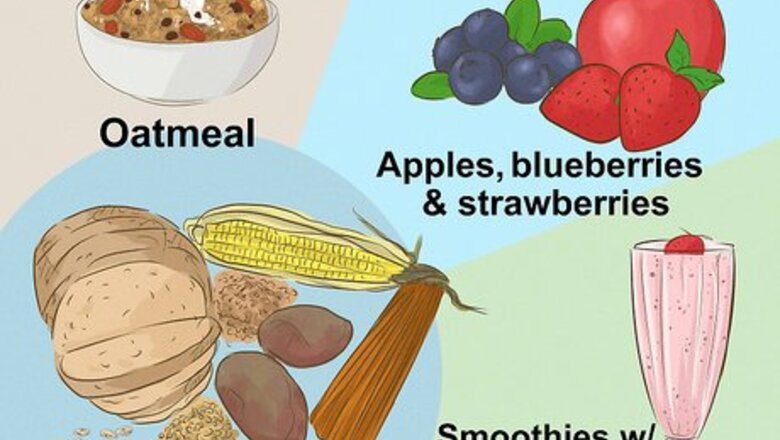
views
Adjusting Your Diet
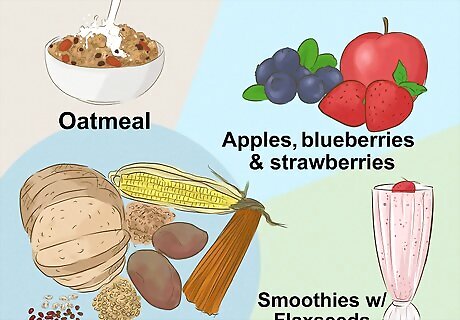
Add more fiber to your diet. Fiber adds bulk, softens stool, and contributes to peristalsis (gentle, rhythmic contractions of the colon), which encourages elimination. More fiber in your body means your colon can move waste out of your body more quickly and efficiently. Aim for about 20 to 35 grams (0.7 to 1 oz) of fiber a day. Make sure you have five servings a day of fruits and vegetables as well as lots of whole grains in your diet. Have 100% whole grains in your diet, such as brown rice, quinoa, oatmeal, millet, and corn. Flax seeds, psyllium husk, wheat bran, and oats are super-sources of fiber. You can prepare flax seed at home, have it in smoothies, or add it to other foods. Fruits like strawberries, apples, and blueberries are high in fiber. Beans, seeds, and nuts are also good sources of fiber.
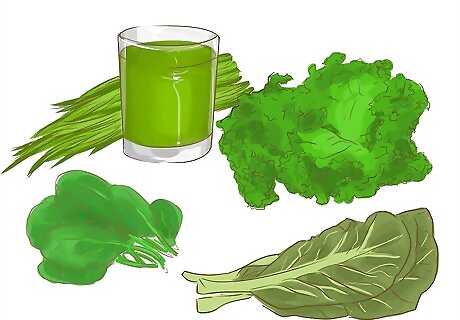
Eat more leafy green vegetables. In addition to providing fiber, leafy greens provide nutrients that help repair your intestines. Try to have at least one leafy green vegetable in each of your meals or as a snack. Alfalfa, wheatgrass, Brussels sprouts, collard greens, kale, spinach, peas, and barley grass are all good leafy greens. You can also try snacking on vegetables by dipping them in hummus, tzatziki, or baba ganoush.
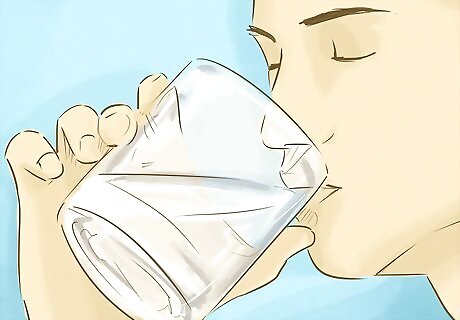
Drink lots of water. Your colon needs water to function properly and clean out any bacteria or waste in your gut. Try to have at least 13 cups of water a day if you are an adult male and nine cups of water a day if you are an adult female. You may increase your water intake if you are doing strenuous exercise or are in a hot, dry environment. You may get in the habit of carrying around a full water bottle with you wherever you go so you can hydrate throughout the day. You may also set a reminder on your phone so you can remember to have at least nine cups of water a day. Try adding sliced lemons, limes, and cucumber to your water to make it taste more exciting. You can also add herbs like mint to your water.
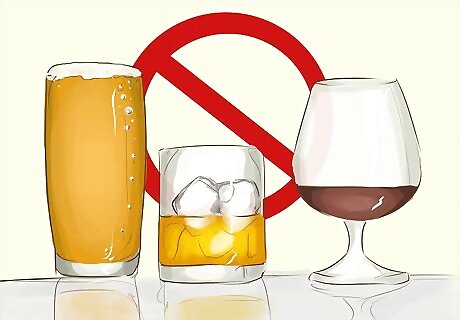
Avoid alcohol. Try to avoid alcoholic beverages, such as beer, wine and hard liquor. They can dehydrate you and lead to constipation. Constipation can clog up the colon with large, impacted, hard-to-pass stool. Also, alcohol can suppress intestinal peristalsis and the urge to go, which makes constipation more likely.
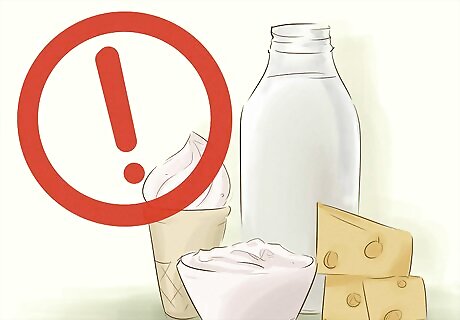
Limit dairy. Milk and dairy products may worsen the symptoms of constipation, especially if you consume a lot of dairy. If you are suffering from constipation, yet are active and drink plenty of fluids, try to limit the amount of dairy products you consume or temporarily take them out of your diet completely.

Drink a cup of coffee or tea. Caffeine can help to stimulate your bowels, which may help to produce a bowel movement. Having a hot beverage may also stimulate your bowels. Try drinking a cup of hot coffee or some black or green tea to get things moving.
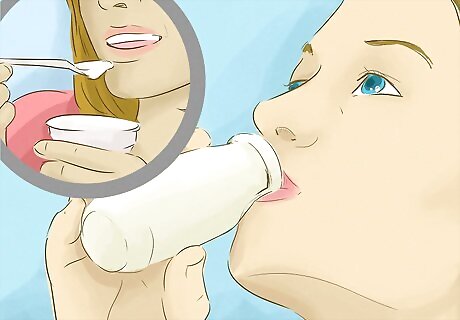
Have fermented foods. Fermented foods contain probiotics, which are bacteria that are beneficial for your colon. These foods populate your gut with good bacteria, allowing your colon to function properly. Yogurt, miso, kimchi, and sauerkraut are four examples of fermented foods. Kefir, apple cider vinegar, and kombucha tea provide drinkable probiotics. You can also take a probiotic supplement. Make sure you buy a probiotic supplement from a reputable supplier online or in a health food store.
Making Lifestyle Changes

Exercise on a regular basis. Physical activity stimulates the digestive system to increase bowel movements. Maintaining a healthy lifestyle can help to ensure your colon stays healthy and functional. Make sure you are exercising on a regular basis, such as every day or at least three times a week. Go for a thirty minute walk every day or schedule in a workout at the gym three times a week to ensure you are burning calories and staying healthy. You can also try doing a home workout with resistance bands to stretch your muscles and build strength. Or you may take an exercise class to help you workout regularly, such as a yoga class or an aerobics class.
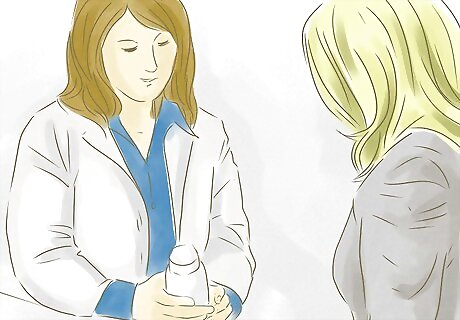
Talk to your doctor before you take over-the-counter laxatives. Often, maintaining a high fiber diet, drinking enough water, and exercising regularly can help your colon function properly. If you are still having issues after making lifestyle changes, consult with your physician before turning to laxatives.
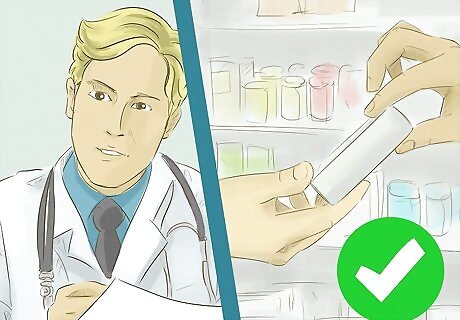
Do your research before taking colon cleansing products. If you are considering a colon cleansing product for daily use, make sure you research the product before using it. These products have not been proven to offer any health benefits. Also, keep in mind that these products are not regulated by the government, so the potency, purity and safety of these products is not guaranteed. Just because a product is labeled as "natural" does not mean it is safe. Talk to your doctor before using any colon cleansing products. Check the ingredients list on the product and make sure the specific herbal ingredients are clearly noted. If you are concerned you may be allergic to any of the ingredients or you cannot identify any of the ingredients in the colon cleansing product, do not use the product. Make sure you drink a lot of water while taking a colon cleansing product. This will ensure you do not become dehydrated and that the product can work properly. Do not use colon cleansing products as a way to lose weight or diet. This is an unhealthy way to lose weight and can lead to other health issues. It has also been shown to be an ineffective way to lose weight.
Talking to Your Doctor
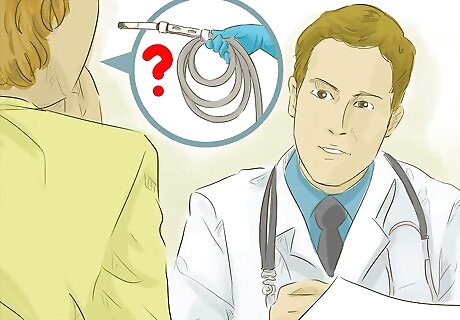
Speak to your doctor about colonic irrigation. Colonic irrigation, also known as colonic hydrotherapy, can help to flush waste material out of your bowels with water. Your doctor may be able to do this procedure for you or recommend a colonic hydrotherapist who can do it for you. Be sure to choose a colonic hydrotherapist who is licensed by a recognized national organization. Before you get the procedure done, speak to your doctor about your medical history to ensure you can safely get the procedure. During the procedure, a pump is inserted into your rectum and about five gallons of warm water are put into your system over a period of time. Once the water is in your colon, the therapist may massage your abdomen to get circulate the water through your colon and to help waste products pass out of your body. The procedure can take about 30 to 45 minutes. You should not have a colonic irrigation performed if you have certain medical conditions, including diverticulitis, severe hemorrhoids, ulcerative colitis, Crohn’s disease, bowel or rectum tumors, recent bowel surgery, heart disease, or kidney disease.
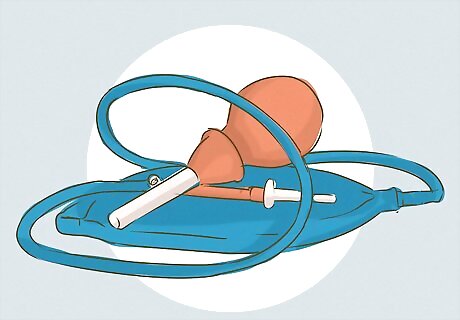
Ask your doctor about an enema. Your doctor may be able to perform an enema on you in their office if your bowels have become impacted or you are having issues with your colon. Enemas are often recommended for constipation and poor bowel movement. Your doctor may recommend a certain type of enema for you, based on your needs. The enema insertion should be done by a trained professional in a sterile space with clean equipment.
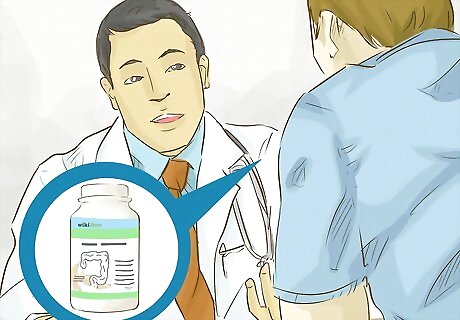
Talk to your doctor about taking medication for your colon. If you have had chronic constipation for longer than six months, ask your doctor about drug treatments that can help to stimulate your bowels. You may resort to this option if adjusting your diet and lifestyle, as well as other colon treatments do not work. Medication may also be a good option if you develop a bowel issue like Irritable Bowel Syndrome (IBS). Make sure you are aware of the side effects of the medication you are taking. If the side effects become severe, you should see your doctor right away. Side effects of colon medications can include short term nausea, dizziness, and cramps.












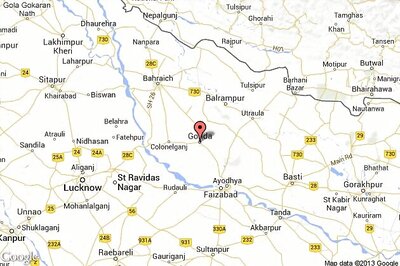




Comments
0 comment